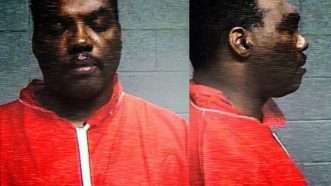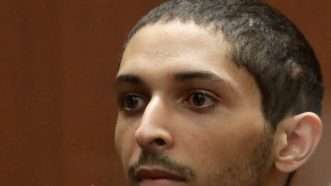Crime
Report: Imprisoning People Who Can't Pay Bail Costs America $15 Billion a Year
Taxpayers shell out big time to keep poor folks who haven't even been convicted of crimes behind bars.
You Can't Use FOIA to Get Someone's Tax Returns
A court rejects a clever effort to obtain President Trump's tax records
Everyone is Misreporting the Texas BDS Lawsuit
No, a Texas school district did not require speech pathologist Bahia Amawi to sign a "pro-Israel oath," nor even to promise not to personally boycott Israel.
Happy Saturnalia!
We continue the longstanding Volokh Conspiracy tradition of celebrating this ancient Roman holiday.
New Draft Article: "Implementing Carpenter"
From my forthcoming book, The Digital Fourth Amendment.
Sex Workers Around the World Demand Decriminalization: Reason Roundup
Plus: Obamacare unconstitutional?
Understanding the New Obamacare Decision, Texas v. United States: Part II
[Part of a continuing series of guest posts by Prof. Josh Blackman (South Texas College of Law). -EV]
Understanding the New Obamacare Decision, Texas v. United States: Part I
[A guest-post by Prof. Josh Blackman (South Texas College of Law), a noted expert on Obamacare-related litigation. -EV]
A "National Declaratory Judgment" in the ACA Suit?
What is the scope of the remedy in Texas v. United States?
Human Trafficking Grant Goes to Arrest Suspected Victims in Tucson
A Tucson Weekly investigation finds that federal funds to "fight sex trafficking" are actually perpetuating it.
Garden State Crime Is Down Since New Jersey Ditched Cash Bail
Money is no longer needed to get out of jail. This hasn't resulted in danger to the community.
8 Years in Prison for Voting Illegally Is Way Too Much
But not according Texas Attorney General Ken Paxton.
Convicted of Brutally Beating His Wife, This Judge Was Given a Second Chance in City Government. Now He's Been Arrested for Her Murder: Reason Roundup
Plus: lawmakers move to allow headscarves on the Hill and private landlords protect from lead better than city Health Department.
Man Pleads Guilty to Charges in Deadly Swatting Prank Call
Police, however, still shift away responsibility for killing unarmed, innocent Wichita man.
"Forget the Blue Wave and Behold the Purple Puddle"
An apt summary, from Prof. Glenn Reynolds (InstaPundit).
The Russians Are at It Again
What language, other than English, is visibly ALL UPPERCASE in this "I voted" sticker I just got here in L.A.?
"The [11-Year-Old] Child 'Has to Get Herself Ready for School and on the Bus with No Supervision by Mother'"
Is that an allegation of abuse?
We Have An Opinion (from SCOTUS)
The Supreme Court issues its first OT2018 decision in an argued case.
Exciting Free Speech Event at the Scalia Law School Next Wednesday, Nov. 14
Join us to see Eugene Volokh, Nadine Strossen, and moderator Brad Smith discuss the Emerging Issues in Free Speech
Foreign governments will not hack this election
The bold predictions episode (No. 238) of the Cyberlaw Podcast
Why are American Jews Increasingly Concerned about Domestic Anti-Semitism?
The percentage of Americans with anti-Semitic attitudes has been stable, but anti-Semites are more active, more visible, and more willing to express their views than in the past.
Dilatory Tactics in a Death Penalty Case?
My co-authored amicus brief urges the Supreme Court to bring an end to decades-long abusive litigation by convicted murderer Russell Bucklew.
On "Shadowy Billionaires," Conspiracy Theories, and Lies
Conservatives' over-the-top attacks on George Soros Mirror Progressives' attacks on the Koch Brothers During the Obama Administration
Why We Need Ideology
Niskanen Center President Jerry Taylor argues that we should reject libertarianism and other ideologies in favor of "moderation." But, in truth, we cannot and should not abjure ideology. Trying to do so is likely to increase bias, not curb it.
Short Circuit: A Roundup of Recent Federal Court Decisions
A barbaric sentence, unpurged voters, and a porcine gag order.
Funny Criminal Law Halloween Present
For those of us who remember State v. Reeves, the Tennessee attempted-poisoning case discussed in the very popular Dressler Criminal Law casebook.
Trump Takes Full Ownership of His Anti-immigrant Nativism with Latest Ad
Candidates used to let political operatives do the dirty work so they could appear above it all. Not Trump.
William Rehnquist Proposed to Sandra Day O'Connor When They Were in Their 20s
Their having dated in law school was well-known, but the proposal was not.
Libertarian Halloween Tips: Reason Roundup
Plus: Halloween Netflix recommendations and a glimpse of Trump trick-or-treating.
Has There Been a Surge of Anti-Semitism Under and Because of Trump?
In short, probably not. And about that ADL study everyone is citing...
Short Circuit: A Roundup of Recent Federal Court Decisions
Weeds, word counts, and would-be blood donors.
Claire McCaskill -- "Not One of Those Crazy Democrats"
What seems to be a real radio ad put out by the McCaskill campaign.
"How Fortunate I Feel to Be an American and to Have Been Presented with the Remarkable Opportunities Available to the Citizens of Our Country"
A letter from Justice Sandra Day O'Connor.
Three Judges, Four Opinions, and a Debate on Auer Deference
What more could you want from a sentencing guideline decision out of a U.S. Court of Appeals?
Migrant Caravan Hysteria Returns
There's no evidence this caravan is full of Middle Eastern terrorists.
Heritage Foundation's Clerkship Boot Camp
It's fine for ideological groups to try to teach their ideas, including to interested future law clerks -- but not to try to limit how the students use those ideas.
Short Circuit: A Roundup of Recent Federal Court Decisions
Root canals, contraband dogs, and a marijuana petition.












